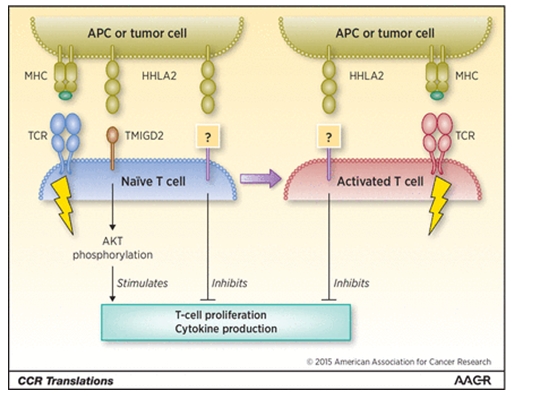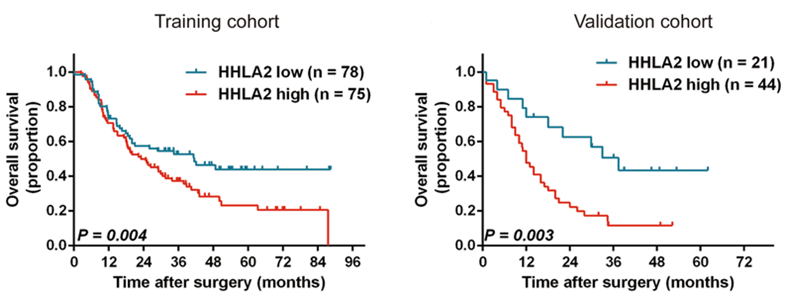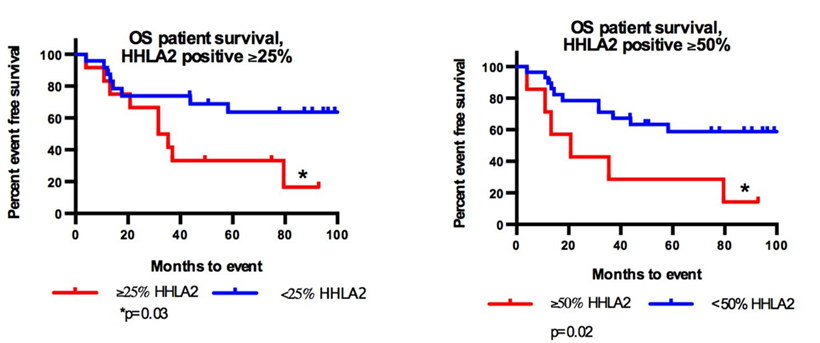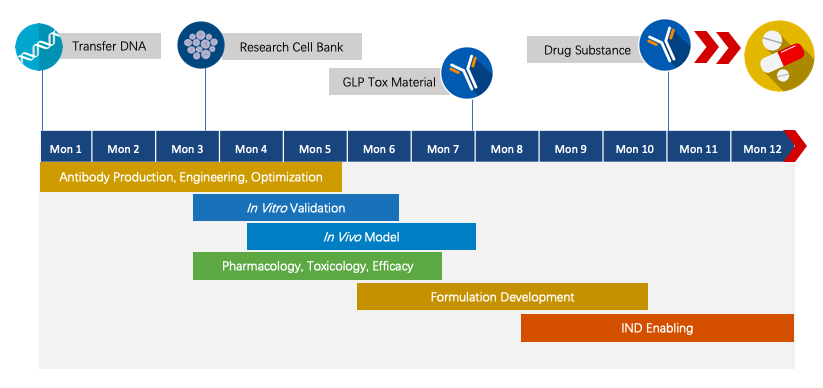About This Program
This program aims to develop anti-HHLA2 therapeutic monoclonal antibody for immuno-oncology.
HHLA2 inhibits TCR-mediated proliferation and cytokine production by CD4+ and CD8+ T cells. Studies have shown that HHLA2 expression is associated with EGFR mutation status and high tumor-infiltrating lymphocytes (TILs) density. In addition, HHLA2 is widely expressed in PD-L1-negative NSCLC samples. Collectively, these data indicate that HHLA2 may be involved in cancer progression through immunosuppression and could be a promising target next to PD-L1 for cancer immunotherapy.
HHLA2
HHLA2 is abbreviated for HERV-HLTR related 2 and is a newly identified immune checkpoint belonging to the B7 family. HHLA2 has been reported to have both co-inhibitory and co-stimulatory functions. Compared to other members of the B7 family, HHLA2 has some unique characteristics:
-
As a type I transmembrane molecule, it has three extracellular Ig domains
-
It is constitutively expressed on peripheral monocytes and can be induced on B cells but not on T cells
-
The receptor for HHLA2 is present on a wide range of immune cells, such as T cells, monocytes, and B cells, as well as endothelial cells. Most of these receptors are still unidentified
 Fig.1 Model for HHLA2 interaction with two receptors to regulate T-cell functions.1
Fig.1 Model for HHLA2 interaction with two receptors to regulate T-cell functions.1
HHLA2 in Cancer Studies
Here are some published data about HHLA2 work as a potential target for cancer immunotherapy.
-
High HHLA2 expression was significantly associated with poor overall survival in intrahepatic cholangiocarcinoma (ICC) patients.
 Fig.2 High HHLA2 expression was significantly associated with poor overall survival in intrahepatic cholangiocarcinoma
(ICC) patients.3
Fig.2 High HHLA2 expression was significantly associated with poor overall survival in intrahepatic cholangiocarcinoma
(ICC) patients.3
 Fig.3 High HHLA2 expression was significantly associated with poor overall survival in intrahepatic cholangiocarcinoma (ICC) patients.2
Fig.3 High HHLA2 expression was significantly associated with poor overall survival in intrahepatic cholangiocarcinoma (ICC) patients.2
-
Higher percentages of HHLA2 expressing tumor cells are associated with worse survival in osteosarcoma.
Indication
HHLA2 is expressed in triple-negative breast cancer (TNBC) and melanoma but has a limited expression in normal tissues. Furthermore, the expression of HHLA2 is associated with the presence of lymph node metastasis and advanced disease in TNBC patients. In TNBC and osteosarcoma, the high expression rates of HHLA2 were 56% (28/50) and 68% (42/62), respectively. In addition, patients with high HHLA2 expression are more likely to have advanced and metastatic disease. In NSCLC, 66% of cases are HHLA2-positive (413/625).
In this case, we hope to develop multiple mAb programs that apply to different indications (not limited to one specific tumor type), of which HHLA2 is highly expressed.
Clinical Trials under Progress
To our knowledge, there are NO ongoing clinical trials of anti-HHLA2 therapeutic monoclonal antibody. Our program will be a pioneer in the development of HHLA2 antibody.
Program Plan
We have extensive knowledge of end-to-end program development. For each program, we are committed to delivering the final complete program to our clients within 1.5 years prior to entering the IND stage.
 Fig.4 The timeline of Next-IOᵀᴹ programs.
Fig.4 The timeline of Next-IOᵀᴹ programs.
Cooperation
Creative Biolabs is looking for potential partners (include but not limit to major pharma or biotech firms) to develop anti-HHLA2 therapeutic monoclonal antibody program together. Our scientists are dedicated to bringing together years of valuable experience to our partner and achieve a meaningful partnership. By doing so, we wish to help both parties to proceed with IND and many stages of clinical trials beyond.
If you are interested, please feel free to contact us so that we can discuss the program and other possible opportunities for cooperation. Look forward to working with you in the near future.


 Fig.1 Model for HHLA2 interaction with two receptors to regulate T-cell functions.1
Fig.1 Model for HHLA2 interaction with two receptors to regulate T-cell functions.1
 Fig.2 High HHLA2 expression was significantly associated with poor overall survival in intrahepatic cholangiocarcinoma
(ICC) patients.3
Fig.2 High HHLA2 expression was significantly associated with poor overall survival in intrahepatic cholangiocarcinoma
(ICC) patients.3
 Fig.3 High HHLA2 expression was significantly associated with poor overall survival in intrahepatic cholangiocarcinoma (ICC) patients.2
Fig.3 High HHLA2 expression was significantly associated with poor overall survival in intrahepatic cholangiocarcinoma (ICC) patients.2
 Fig.4 The timeline of Next-IOᵀᴹ programs.
Fig.4 The timeline of Next-IOᵀᴹ programs.
 Download our brochure
Download our brochure